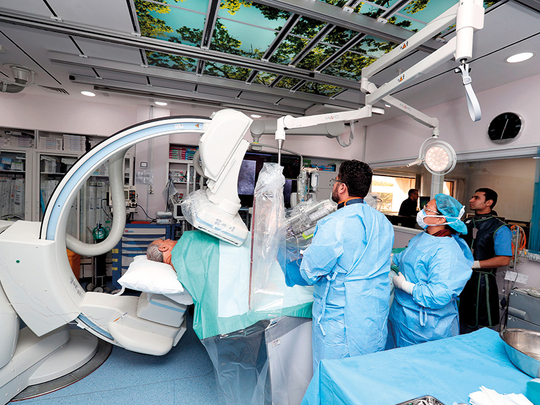
Sharjah: A new robotic surgical device to treat cardiology patients is being adopted by doctors at Al Qasimi Hospital in Sharjah.
The Dh7.5-million robotic device, called CorPath GRX, is a second generation robotic-assisted Percutaneous Coronary Intervention (PCI) system which is used in cardiac intervention operations.
Introduced in the hospital by the Ministry of Health and Prevention, the device is said to be the first of its kind in the Middle East and among one of the first globally which allows easy and flexible access to the arteries to be treated.
Dr Arif Al Nooryani, executive director and consultant cardiologist at Al Qasimi Hospital, told Gulf News: “Al Qasimi Hospital is the first in the Middle East to have the latest generation CorPath GRX system and among the first hospitals in the world to use the new procedural automation software in patients.
During a CorPath Robotic-assisted PCI procedure, physicians sit in a radiation-shielded workstation and use a set of joysticks and touchscreen controls that translate the physician’s movements into device control, he said.
Robotic-assisted PCI enables precise measurement of anatomy and device positioning with the added benefit of radiation protection for the physician and the potential to reduce radiation exposure for staff and patients.
Dr Al Nooryani said the system enables robotic-guided catheter manipulation in addition to guide-wire control as well as balloon/stent delivery.
The CorPath GRX system has been used successfully in 10 patients who suffered from complex cases, he said.
The patients were of different nationalities and aged between 35 and 60.
The cost of the operation ranges between Dh25,000 and Dh50,000.
Dr Al Nooryani said Al Qasimi Hospital has become the first in the world, outside of the USA, to use the only robotic system in the world to perform coronary angioplasty.
He said that while the human hand has a precision ranging from 5mm to 10mm, the robot-assisted surgery can perform surgical procedures with a precision of 1mm.
The robotic procedure takes as much time like a normal procedure.
Around 26 of interventional cardiologists staff were trained on robotic-assisted percutaneous coronary interventions, he said.
Benefits
99.1% clinical success in complex cases along with comparable procedure times to manual PCI.
95% reduction in radiation exposure to the primary operator.
17% reduction in radiation dose to the patient compared to manual PCI.
Reduction in Stent Usage: A recent study demonstrated that accurate measurement of coronary anatomy, using CorPath, reduced the use of unnecessary additional stents by 8.3%.












